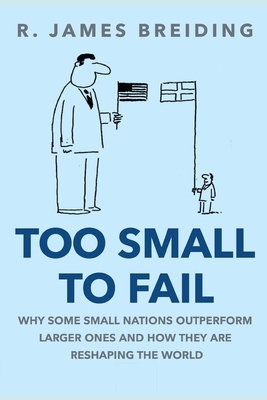Too Small to Fail: Why Small Nations Outperform Larger Ones and How They Are Reshaping the World

Too Small to Fail: Why Small Nations Outperform Larger Ones and How They Are Reshaping the World
The old world order is changing rapidly, with influence declining for leading global powers. As large countries from the USA to the UK struggle to control divided populations, bipartisan polarization, and government distrust, it has become clear that bigger no longer means better.In their place, a number of smartly led small countries - from Denmark to Switzerland to Singapore - have emerged at the front of the pack. The world's smallest nations have consistently topped a range of global rankings from national competitiveness to the happiness of their citizens. Across the globe, they are driving a quiet revolution and redefining what it means to be a great nation.How do they achieve better educated, happier, and wealthier societies? What are their recipes for success? Too Small to Fail considers how eight small countries have tackled the global issues with brilliant policies, individuals, and institutions.Readers will learn how Singapore achieves superior health care outcomes at one quarter of the cost of the US, and how Israel has created a start-up ecosystem to rival Silicon Valley. They will learn how in the Nordics, Copenhagen is well on its way to becoming the world's first carbon-neutral capital city, whilst Finland has engineered a world-renowned primary education system. Too Small to Fail argues that through these achievements, small nations lead by example and in many ways arrive at the future first. At a time when multilateralism is in decline among large nations, and the left is bickering with the right, Too Small to Fail is paddling in the opposite direction. Whether we like it or not, the world's most intractable problems - global warming, immigration, trade and aging populations - are borderless, which means shared solutions are necessary. By studying the parallels between these outperforming nations, Too Small to Fail suggests that a new, collaborative order is possible. The conclusion is clear: small nations have big lessons to teach us all.
PRP: 154.92 Lei
Acesta este Pretul Recomandat de Producator. Pretul de vanzare al produsului este afisat mai jos.
139.43Lei
139.43Lei
154.92 LeiLivrare in 2-4 saptamani
Descrierea produsului
The old world order is changing rapidly, with influence declining for leading global powers. As large countries from the USA to the UK struggle to control divided populations, bipartisan polarization, and government distrust, it has become clear that bigger no longer means better.In their place, a number of smartly led small countries - from Denmark to Switzerland to Singapore - have emerged at the front of the pack. The world's smallest nations have consistently topped a range of global rankings from national competitiveness to the happiness of their citizens. Across the globe, they are driving a quiet revolution and redefining what it means to be a great nation.How do they achieve better educated, happier, and wealthier societies? What are their recipes for success? Too Small to Fail considers how eight small countries have tackled the global issues with brilliant policies, individuals, and institutions.Readers will learn how Singapore achieves superior health care outcomes at one quarter of the cost of the US, and how Israel has created a start-up ecosystem to rival Silicon Valley. They will learn how in the Nordics, Copenhagen is well on its way to becoming the world's first carbon-neutral capital city, whilst Finland has engineered a world-renowned primary education system. Too Small to Fail argues that through these achievements, small nations lead by example and in many ways arrive at the future first. At a time when multilateralism is in decline among large nations, and the left is bickering with the right, Too Small to Fail is paddling in the opposite direction. Whether we like it or not, the world's most intractable problems - global warming, immigration, trade and aging populations - are borderless, which means shared solutions are necessary. By studying the parallels between these outperforming nations, Too Small to Fail suggests that a new, collaborative order is possible. The conclusion is clear: small nations have big lessons to teach us all.
Detaliile produsului









